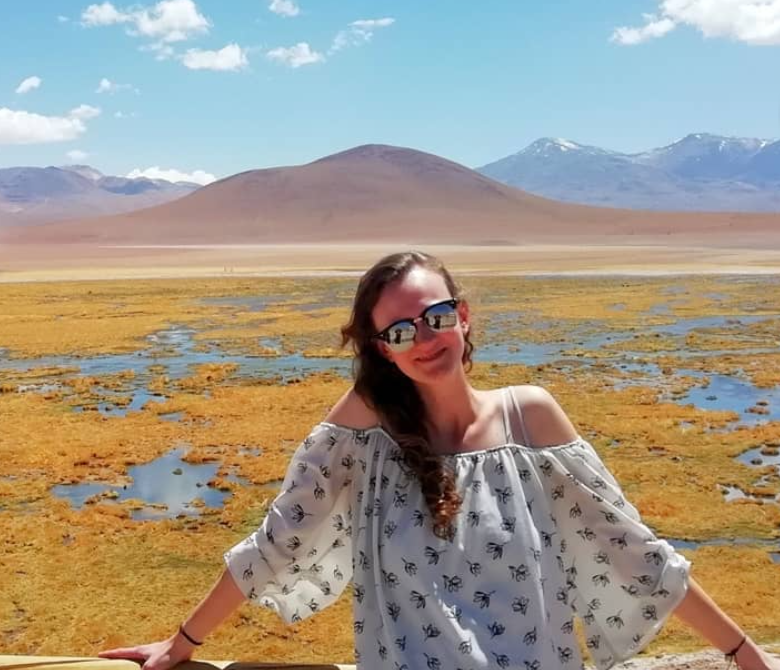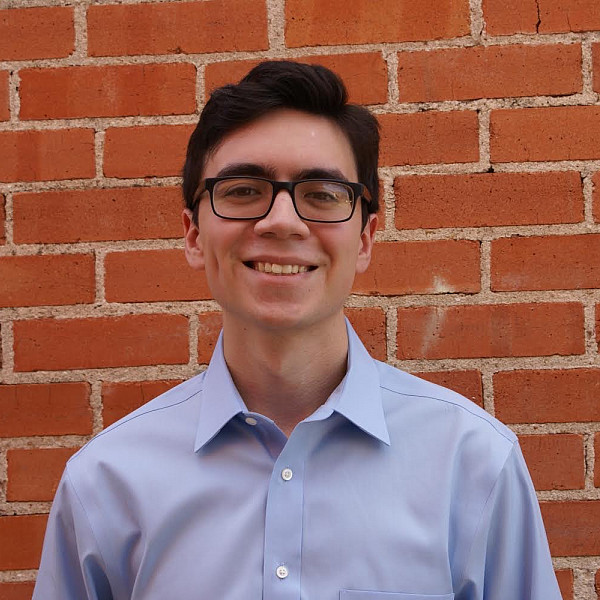News
A World Traveler
April 06, 2021
April 06, 2021
Open gallery

The first time Brielle Read ’20 traveled abroad, she was a first-year student in high school. In eighth grade, she had coordinated a project for the Girl Scouts that entailed rerouting books that were intended for recycling from the Austin Independent School District to the Republic of Malawi. Read worked with the Malawi Project, a nonprofit humanitarian organization that supports community development, education, and famine relief to those who need it most in southeastern Africa. The donation she orchestrated was around 33,000 books, and a year after she began the project, she traveled to Malawi with her family and the head of the nonprofit. “It was my first exposure with working with other countries,” Read recalls. She received a letter of recognition from the country’s president for her efforts.
She was 14.
By the time Read matriculated at Southwestern, she had also already volunteered as a curriculum consultant, translator, and fundraising event organizer in Lima, Peru. She attributes her interest in Latin American countries to studying Spanish—“it’s obviously so much easier to connect with the culture and a wider array of people” if you know the language, she says—and the support of the Academy for Global Studies at Austin High School, whose generous scholarship program enabled her to visit Costa Rica and Ecuador as well. Her interests in the Spanish language, Latin American culture, and education were further nurtured at SU, and they help explain how and where she spent the past year and change: studying and then working abroad as an English teaching assistant in Santiago, Chile, while preparing to move to Uruguay as a Fulbright Scholar. “One thing I’m really excited about is that the Fulbright really encourages you to get involved in the community,” she says of the prestigious program. “So one thing I’m hoping to do is give English classes to groups that usually don’t have access, whether because work hours don’t permit them to take classes or they’re not financially able to.”
A musician adopts a sociological view
Read’s commitment to improving equity in education and her passion for Latin America were destined to shape her experiences at Southwestern and her postgraduate career, but it was actually the Sarofim School of Fine Arts that convinced her to choose SU initially. Having played the violin since the age of four, Read wanted to attend a smaller liberal-arts college “because it allows for a closer relationships instead of getting lost in a crowd,” and she specifically wanted a school that genuinely supported the fine arts. “I was impressed when I went on a tour at Southwestern: they had this beautiful building [the Alma Thomas Fine Arts Center], and they had really qualified, great faculty teaching,” she recalls, “so what really drew me to Southwestern was how dynamic it was and that it didn’t focus on just the arts or just STEM but really tried to give attention to all of the different areas of the university.”
She joined the orchestra, which she would perform with every semester except her last. Meanwhile, she began her coursework in international studies (her eventual minor) with a focus on, naturally, Latin America. But taking the introductory course Social Patterns and Processes with Professor of Sociology Sandi Nenga opened her eyes to a nuanced worldview. “It just changed the way that I thought about society and the inequality that exists within society,” Read remembers. “It was one of those classes that I never wanted to miss, and I worked so hard on all of assignments just because they were so interesting to me, which is the way I think a major should feel.”
“It just changed the way that I thought about society and the inequality that exists within society.”
As a sociology major, Read was able to apply those newly discovered insights to her existing passion for education. Early on, for example, she studied how teachers’ perceptions of their students (e.g., even being told that some students were classified as “gifted and talented” versus “regular”) affects those pupils’ success. “Having the ability to recognize through a sociological lens that this is such an important part of a student’s life is something I hope to bring into my teaching in the future,” Read explains. And in her capstone course with Professor of Sociology Maria R. Lowe, she researched the factors that affect a child’s placement in the special-education system in Texas public schools.
“My mom’s a special-ed teacher,” she reveals, “so I think a lot of it was sparked from that because I heard a lot of stories growing up about weird discrepancies between why a student gets puts in special ed [and whether] they should be or not.”
Read interviewed teachers representing different elementary schools, and she discovered that a school’s financial resources had a tremendous impact on the availability of special-education programs—and that financial and therefore educational inequities were present even within a single school district, leaving many students in need at a disadvantage. She went on to present her research project, “Letting the Teachers Speak: Teachers’ Perspectives on the Special-Education Identification Process in Public Texas Elementary Schools,” at Southwestern’s Research and Creative Works Symposium and the 82nd annual meeting of the Southern Sociological Society, in Atlanta, Georgia. “Dr. Lowe was so supportive and really pushed us. At times, it felt like she was pushing us too much,” Read says with a laugh, “but looking back on it, she was really pushing us to create quality projects—quality capstones that ended up getting most of my class into presenting at a national conference.”
Preparing for the world
In addition to sociology, Read credits her Spanish classes at Southwestern for preparing her for a work exchange in Tunja, Colombia, in the summer of 2018 and in Antofagasta, Chile, during her last semester. “Once you get above the basic levels of Spanish, you start taking more advanced classes about movies or cultural concepts, and it really gets you thinking and communicating in a way that gave me confidence during my first time living abroad in Colombia. That was impactful,” she reflects. And it was actually Professor of Spanish Laura Senio Blair, a 2012 Fulbright recipient herself, who taught Read about the scholarship opportunity during an office-hours conversation in which Read was expressing her hopes of getting certified to teach English and learning more about linguistics. “Honestly, I had never heard about it before,” she says, but after researching the Fulbright program, she knew it was the right fit for her goals.

The Fulbright application required a months-long process of writing essays and revising according to feedback from a committee of mentors at Southwestern. As any writer would attest, Read sometimes felt frustrated when submitting drafts that she felt were strong and receiving abundant—albeit constructive—criticism. But, she says gratefully, “every bit of feedback really helped me to get where I am now.” She also learned to appreciate that those suggestions symbolized her professors’ investment in her as well as their confidence in her chances of winning such a venerable scholarship.
When Read was notified that she was a semifinalist, she says, “it was exciting and unreal.” Still, she didn’t want to celebrate just yet considering there was no guarantee she’d make the next cut. However, once she learned she had won an award for an English teaching assistantship—joining the 2,100 other 2020–2021 scholars who were selected in the open, merit-based competition that has in decades past produced 60 Nobel Prize laureates, 88 Pulitzer Prize recipients, and 37 heads of state or government—she was grateful and relieved. “It was still just a really surprising thing because I thought it was a long shot to apply to something like this!” she shares.
An educator and a cultural ambassador
Read received word of her award while working in Chile. She had been studying abroad there during her last semester of coursework for Southwestern in fall 2019 (her official graduation date was May 2020), but having earned her certificate in English language teaching for adults, or CELTA, in summer 2019, she had landed a postgrad job at an English institute in Santiago. At the time, she switched her student visa to a work visa, and she is currently in her second year of observing classes and teaching lessons with the school today. She’ll remain there until her 9- to 10-month Fulbright posting to Uruguay, which is currently slotted to begin in either July 2021 or March 2022, depending on the country’s COVID status. The core of her responsibilities for the scholarship program will likely be quite similar to what she’s been doing the past couple years, except, she says, that “one of the big differences is that I will probably be working within a public school—I’m in a private school now. And there will be more of that expectation that I’m a cultural ambassador, although I like to think I’m a cultural ambassador right now!” She also looks forward to completing a sociological research project on the perception of English language learners in Uruguay and how that might relate to the country having one of the smallest wealth gaps in Latin America.
After the Fulbright, Read says she isn’t exactly sure what career she’ll pursue or where she’ll seek those opportunities. She might continue teaching abroad or in the U.S., or she might go for a graduate degree in sociolinguistics. Her only commitment, she says, is to keeping an open mind. “I don’t see the point right now of creating this really long-term plan because, usually, whenever I’m in a certain place or country, opportunity just presents itself,” she explains. “For example, I found this job while I was studying abroad. So I prefer to go to Uruguay and see what happens there. There’s a possibility that other career possibilities will come up because of that Fulbright.”
That ability to remain open to and ready for anything, she continues, is a lesson she learned from SU. “The way that Southwestern prepares students with liberal-arts degrees, it’s not so much ‘I know how to do this one thing,’” she says. “It gives you this way of thinking about certain topics and life in general that prepares you to go into a lot of different fields or areas.”

















